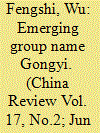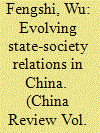| Srl | Item |
| 1 |
ID:
153570


|
|
|
|
|
| Summary/Abstract |
Contestation and mutual infl uence between the state and civil society
go beyond formal institutional realms, and extend into the ideational
spheres of social labeling, public speech, and collective consciousness
building. Based on data from a three-year research project, this article
analyzes Chinese activists and nongovernmental organization (NGO)
practitioners’ preferences for group identity, and fi nds “gongyi zuzhi”
(public interest organization) to be the most popular social label. Th e
article thus argues that if there exists a collective sense of belonging
among activists and NGO practitioners in China’s civil society, the
discursive contour of this sense of belonging is most likely to be “for
public interest.” The article further maps out possible associations
between one’s NGO-related work experience and refl ections on group
identity. “Gongyi” as a shared social label may not be politically
inspiring to some, but it carries a straightforward message of “working
for the public good” and discursive potential for meaning making. Th is
fi nding suggests not only society’s embeddedness and activists’ pragmatism,
but also maturing collective consciousness and discursive
autonomy in China’s civil society
|
|
|
|
|
|
|
|
|
|
|
|
|
|
|
|
| 2 |
ID:
153565


|
|
|
|
|
| Summary/Abstract |
This special volume attempts to enhance the understanding of a seemingly
paradoxical pair of patterns in contemporary Chinese politics,
namely, the resilience of the Communist regime and the robustness of
social autonomy. Th e papers, while contributing to the central theme
from different sectors/subfields, converge on the aspect where the
agencies of the Chinese state and the society interact and exert infl uence
on each other. Instead of simply giving away summaries and revealing
intricate findings, this introduction focuses on the overall scope and
shared analytical perspective of all the papers included, and the interlinkages
across them in order to facilitate the reading of the whole volume.
|
|
|
|
|
|
|
|
|
|
|
|
|
|
|
|